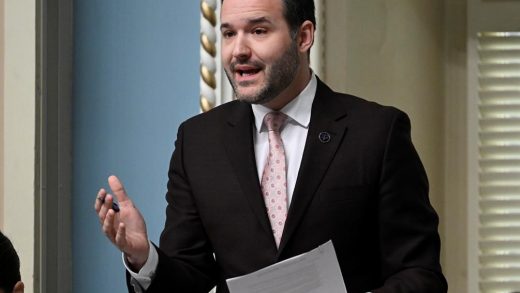:format(webp)/https://www.thestar.com/content/dam/thestar/entertainment/music/opinion/2022/06/03/gilbert-and-sullivan-in-the-opera-house-where-does-this-leave-verdi-puccini-and-wagner/peter_mcgillivray.jpg)
Now don’t get me wrong; I love Gilbert and Sullivan as much as I love “Monty Python’s Flying Circus.” There is a little John Cleese in all of us.
But what has Canada’s self-described second largest opera company been doing this spring by producing “H.M.S. Pinafore”?
OK, so the Canadian Opera Company once produced — and produced very well — the Broadway musical “Kismet.” So why shouldn’t Vancouver Opera slum a little?
Slum? Well, snob that I am, I happen to believe that opera companies should be producing opera. And the reason? We in Canada are operatically underserved. Our so-called second largest company offers its patrons the grand total of three mainstage productions annually and this season, shockingly, so does our largest company.
So where does this leave Verdi, Puccini and Wagner? Out in the Canadian cold, that’s where.
While it is true that Canada is developing a number of smaller, more experimentally minded companies, sometimes championing new work, our mainstream companies, particularly during these COVID-conscious times, seem to be trying to play it safe.
Of course they want to expand their audience. What they are doing in the process is becoming less of who they are. And it doesn’t always work. Tom Wright, general director of Vancouver Opera, expressed disappointment recently at the ticket sales for “H.M.S. Pinafore,” a hit when his company last produced it several years ago.
I sat through one of this season’s performances and was disappointed as well, not only by the attendance but by a not unrelated awareness that Vancouver Opera had failed to bring this vintage 1878 piece of Victoriana fully to life.
There was certainly life present in the person of Peter McGillivray in the scene-stealing role of Sir Joseph Porter, K.C.B., first lord of the admiralty. And he was certainly not surrounded by cadavers among “his sisters and his cousins and his aunts.”
What the cast nevertheless needed was the kind of energy and sense of style Brian Macdonald brought to his Stratford Festival Gilbert and Sullivan productions. Brenna Corner brought bits of business but no firm directorial hand and her colleague in the pit, Rosemary Thomson, now in her 15th season as music director of the Okanagan Symphony Orchestra, conducted at a tepid temperature.
No, the production was not really incompetent, it was provincial, further hampered by the unflattering acoustics of the Queen Elizabeth Theatre. Two days after attending “H.M.S. Pinafore,” I found myself in Toronto’s Four Seasons Centre, listening to the Canadian Opera Company’s production of Verdi’s “La Traviata” and wondering why the music suddenly sounded so loud.
The music sounded loud because I was sitting in a real opera house with fine acoustics. It isn’t often enough appreciated how much most Canadian opera companies suffer, like Vancouver’s, from unsympathetic accommodations.
The Vancouver Opera, like its sister companies, has certainly suffered through a couple of years of COVID-19 shutdowns and audience restrictions, having at one point had to cut its budget virtually in half.
But there won’t be any Gilbert and Sullivan in the season ahead. To its considerable credit, the company will be bouncing bravely back with three substantial and far from over-performed operatic pieces, beginning with Bizet’s “The Pearl Fishers” (Oct. 22-30), continuing with Britten’s “A Midsummer Night’s Dream” (Feb. 11-19) and concluding with Wagner’s “The Flying Dutchman” (April 29-May 7).
This, remember, is the company that introduced the world to Joan Sutherland’s Norma and Lucrezia Borgia, staged the Canadian premiere of John Adams’ “Nixon in China” and commissioned Lillian Alling. There are remarkable pages in its history.
Granted, its days of five annual mainstage productions appear to lie, at least temporarily, in the past. But the Vancouver Opera is a national leader in its education programs, its schools program having brought short operas in English to more than 1.6 million children.
While “H.M.S. Pinafore” may have failed to bring capacity crowds back to the Queen Elizabeth Theatre, Wright believes at least part of the explanation lies with the reluctance of people to return to regular theatregoing when COVID-19 remains a societal presence.
As an inducement to return, the company plans to present its first free outdoor concert in a Burnaby park in July. “We want to send the message that opera is fun,” he said.
It is a message opera producers throughout North America are sending. In pursuit of younger audiences, less wedded to the standard repertory, they are also becoming more responsive to the sounds of our time. As well as the concerns.
In commissioning “Naomi’s Road,” an opera based on Joy Kogawa’s book about a Japanese-Canadian girl’s experience of her family’s internment during the Second World War, the company addressed a subject with continuing resonance for British Columbians.
So maybe an occasional tone-lightening laugh with Gilbert and Sullivan may not be such a bad idea after all. Just make sure the right people are telling the jokes.
JOIN THE CONVERSATION


